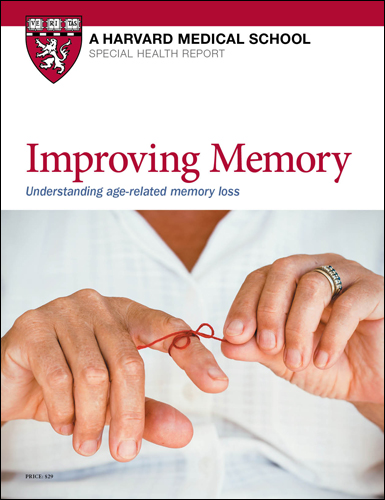
Zinc: What it does for the body, and the best food sources

Respiratory health harms often follow flooding: Taking these steps can help

Tips to leverage neuroplasticity to maintain cognitive fitness as you age

Can white noise really help you sleep better?

Celiac disease: Exploring four myths

What is prostatitis and how is it treated?

What is Cushing syndrome?

Exercises to relieve joint pain

Think your child has ADHD? What your pediatrician can do

Foam roller: Could you benefit from this massage tool?


A Guide to Cognitive Fitness
In this Special Health Report, Harvard Medical School doctors share a six-step program that can yield important and lasting results. Together these “super 6” can strengthen your intellectual prowess, promote your powers of recall, and protect the brain-based skills that are essential for full, rewarding, and independent living. From simple and specific changes in eating to ways to challenge your brain, this is guidance that will pay dividends for you and your future.
Other Product Information
What is cognitive fitness? Cognitive fitness goes far beyond memory. It embraces thinking, learning, recognition, communication, and sound decision-making. Cognitive fitness is the bedrock of a rewarding and self-sufficient life.
A Guide to Cognitive Fitness will show you how to sidestep threats to your brain’s wellness. You’ll learn how to build a “cognitive reserve” to address your brain’s changes. Most of all, you’ll shape and secure fulfilling and lasting mental fitness.
As never before, you can attain lasting brain health. Harvard Medical School doctors have identified six steps which, together, can spur and protect cognitive fitness.
This multi-pronged plan includes and integrates proven approaches like optimal nutrition, exercise, stress reduction, social interaction, sleep, and stimulating activities. By incorporating simple, specific changes into your daily routine, you can add years of enduring mental stamina and vitality.
Prepared by the editors of Harvard Health Publishing in consultation with Alvaro Pascual-Leone, MD, PhD, Professor of Neurology, Harvard Medical School, Medical Director, Deanna and Sidney Wolk Center for Memory Health, and Senior Scientist, Hebrew SeniorLife. 53 pages. (2024)
Cognition—the ability to think, learn, understand, and remember—stems from the brain. Without the sophisticated network made up of billions of neu ral connections, you wouldn’t be able to read a book, have a conversation, solve a crossword puzzle, talk to friends, drive a car, or do any of the hundreds of tasks that make up your days.
To accomplish all these tasks, the brain must be adaptable. Brain cells known as neurons (the type of cell that makes up nerve tissue) are highly specialized, but they are engaged in very flexible and continuously changing networks. Although your brain does not re place cells in the same way that other organs do, it is continuously reshaping the connections between cells. Literally thousands of new connections are made— and unused connections are cleared—every second. Scientists refer to this ongoing reorganization as brain plasticity, or neuroplasticity.
Researchers now know that, while the brain remains plastic throughout life, the efficacy of these mechanisms changes throughout your lifetime. That means that your brain isn’t necessarily declining, but it is constantly evolving over time. So if you’re 65 years old, having a healthy brain does not mean possessing the processing skills of a 25-year-old brain. Instead, it means having a brain that is in the best possible con dition for your current age. Scientists believe that you can maintain your brain’s optimal plastic capacity for your age by engaging in activities like exercise and cognitive tasks that challenge your brain.
- Cognitive fitness: Your No. 1 health goal
- How cognitive function is shaped over a lifetime
- Medical conditions that affect the brain
- Heart disease and stroke
- Diabetes
- Obesity
- Dementia
- Traumatic brain injury (TBI)
- Other causes of cognitive decline
- STEP 1: Eat a plant-based diet
- Foods linked to better brainpower
- Best diets for cognitive fitness
- Brain-draining foods
- Supplements and the brain
- STEP 2: Exercise regularly
- The many benefits of exercise
- Reduce sedentary time
- Safety first
- Is exercise boosting your cognitive fitness?.
- STEP 3: Get enough sleep
- Sleep stages and memory
- Sleep and inflammation
- How sleep changes as you age
- Strategies for better sleep
- STEP 4: Manage your stress
- The cardinal rules of mental stimulation
- Low-tech brain-training activities to try.
- Computer-based brain-training games
- STEP 5: Nurture social contacts
- How social connections affect cognition
- How to widen your social network
- Staying connected in the digital age.
- STEP 6: Continue to challenge your brain
- What happens to your brain when you’re stressed?.
- Ways to manage stress
- The power of positivity and purpose
- Resources
- Glossary
You might also be interested in…

Improving Memory: Understanding age-related memory loss
By age 60, more than half of adults have concerns about their memory. However, minor memory lapses that occur with age are not usually signs of a serious problem, such as Alzheimer’s disease, but rather the result of normal changes in the structure and function of the brain. This report, Improving Memory: Understanding age-related memory loss, describes these normal age-related changes and other more serious causes of memory loss — and how to distinguish between them.

Zinc: What it does for the body, and the best food sources

Respiratory health harms often follow flooding: Taking these steps can help

Tips to leverage neuroplasticity to maintain cognitive fitness as you age

Can white noise really help you sleep better?

Celiac disease: Exploring four myths

What is prostatitis and how is it treated?

What is Cushing syndrome?

Exercises to relieve joint pain

Think your child has ADHD? What your pediatrician can do

Foam roller: Could you benefit from this massage tool?
Free Healthbeat Signup
Get the latest in health news delivered to your inbox!
Sign Up

